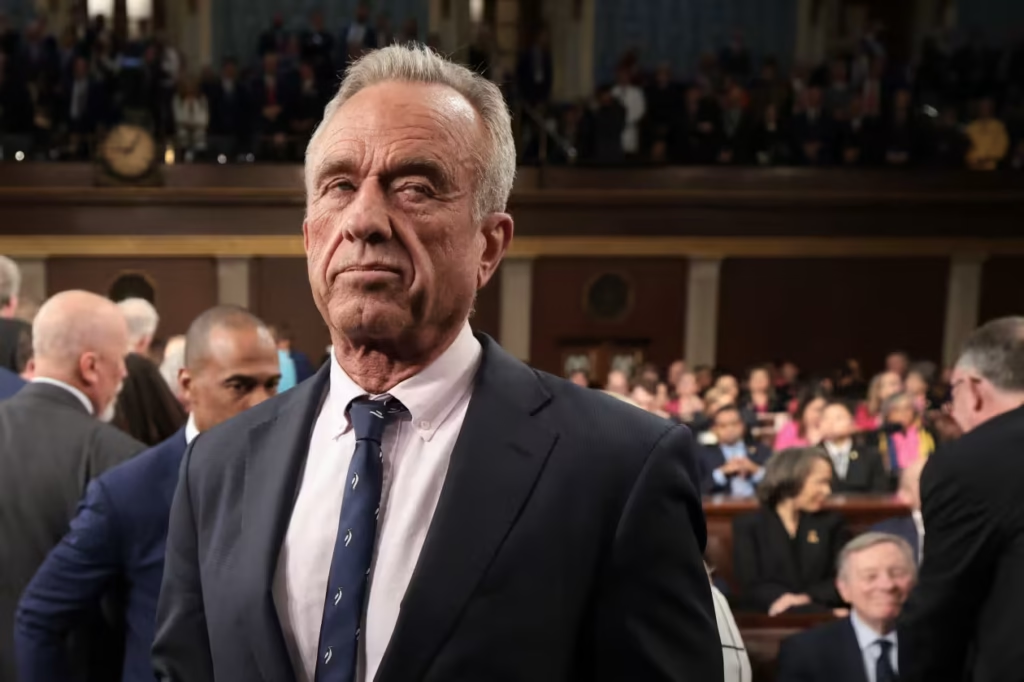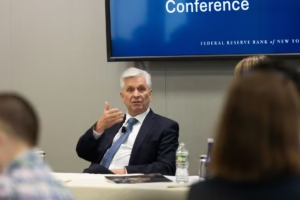The Trump administration should “re-evaluate” Robert F. Kennedy Jr.’s position as secretary of the Department of Health and Human Services, according to two Wall Street analysts who said Monday that his “apparent anti-science and libertarian agenda” posed a threat to public health.
The comments were made by Cantor Fitzgerald analysts following the resignation of Peter Marks, the primary vaccine regulator for the Food and Drug Administration, last week due to disagreements with Kennedy, a well-known vaccine skeptic, who claimed that Marks wanted “subservient confirmation of his misinformation and lies.”
Josh Schimmer and Eric Schmidt, two analysts, wrote in a research note, “We call on the administration to re-evaluate RFK Jr.’s role at HHS.” “Pushing out one of the most trusted leaders of the FDA to promote an anti-science agenda is a step too far for us.”
“RFK Jr.’s apparent anti-science and libertarian agenda is putting people’slives in jeopardy to advance a discredited theory on vaccines,” they stated.
A request for comment was not immediately answered by the Department of Health and Human Services.
It is uncommon for Wall Street analysts’ notes to clients to criticize a government official in such blunt terms. Later in the note, however, that wording got even more acerbic. As worries about a recent surge in measles cases and vaccine skepticism persist, the analysts indicated that their critiques had nothing to do with politics, stocks, or financials, but rather with public health.
“We are not proud to have RFK Jr. at HHS,” they stated. “Based on his own whims and debunked views, he is leading this nation into perilous ground. Some had hoped he would remain focused on his diet and fitness, but he has gone well beyond his comfort zone. He should be removed from the pool now.
The Department of Health and Human Services includes the FDA. Former Cantor CEO Howard Lutnick is now Trump’s secretary of commerce, as reported by Bloomberg News.
In a statement on Friday, Marks stated that his retirement as head of the Center of Biologics Evaluation and Research and his resignation from the FDA will take effect on April 5. In 2012, he began working for the FDA. He was frequently forgiving of new medicine approvals, according to the Cantor analysts, who also commended his openness and dedication to statistics.
On Monday, Marks’ revelation caused equities linked to vaccines to decline. Moderna Inc.’s (MRNA) stock fell 8.9%. The stock of Novavax (NVAX) ended the day down 8.4%.
“We expect companies with vaccine businesses to be volatile this week” as investors analyze Marks’ resignation, according to a note released by Truist analysts on Monday. Regarding the future of COVID-19 vaccines, they also expressed concerns, stating that any replacement for Marks, who turned out to be a “yes-person,” “may expand the influence of RFK Jr.’s vaccine rhetoric.”
In a separate note published on Saturday, Stifel analysts stated that Marks’ exit “was arguably biotech investors’ greatest fear with the Trump administration.”
They also stated: “While it seems that the direct disagreements here were over vaccines, the implications for biotech stocks could be far-reaching, given Dr. Marks’ commitment to FDA transparency and flexibility.”
Analysts’ comments come as markets continue to be uneasy over President Donald Trump’s attempts to change international trade accords, ostensibly to increase employment in the United States and reduce government expenditures. In a letter on Monday, about 1,900 experts stated that they perceived “real danger in this moment.”
Other Wall Street analysts have recently spoken more sharply about policy in other places. This month, prominent Tesla bull Dan Ives, a Wedbush analyst, urged Elon Musk to “step up” in his leadership of the electric vehicle manufacturer as he assists in attempts to reduce government spending while working for Tesla Inc. (TSLA).





